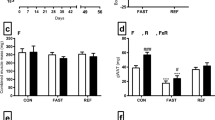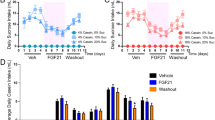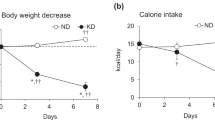Abstract
The purpose of this study was to determine the impact of acute ethanol administration on the major signal transduction pathways in skeletal muscle responsible for regulating the protein synthetic and degradative response to refeeding. Adult male C57Bl/6 mice were fasted overnight; mice were then either refed normal rodent chow for 30 min or a separate group of mice remained food deprived (i.e., fasted). Thereafter, mice were administered either 3 g/kg ethanol or saline. Gastrocnemius/plantaris was collected 1 h later and analyzed. Acute ethanol decreased basal and prevented the refeeding-induced increase in muscle protein synthesis. While ethanol prevented a nutrient-stimulated increase in S6K1 phosphorylation, it did not alter the increase in 4E-BP1 phosphorylation. Downstream of S6K1, ethanol also attenuated the refeeding-induced increase in S6 and eIF4B phosphorylation, as well as the decrease in eEF2 phosphorylation. Although ethanol decreased ERK and p90 RSK phosphorylation, activation of this signaling pathway was not altered by refeeding in either control or ethanol-treated mice. Related to protein degradation, in vitro-determined proteasome activity and the content of total ubiquitinated proteins were not altered by ethanol and/or refeeding. Control mice appeared to exhibit a refeeding-induced decrease in autophagy as suggested by the increased FoxO3 and ULK1 phosphorylation and total p62 protein as well as decreased LC3B-II; however, ethanol blunted these refeeding-induced changes. These data suggest that ethanol can acutely prevent the normally observed mTOR-dependent increase in protein synthesis and reduction in autophagy in response to nutrient stimulation, but does not appear to acutely alter proteasome activity.





Similar content being viewed by others
References
Kimball SR, Lang CH (2018) Mechanisms underlying muscle protein imbalance induced by alcohol. Annu Rev Nutr 38:197–217. https://doi.org/10.1146/annurev-nutr-071816-064642
Thapaliya S, Runkana A, McMullen MR, Nagy LE, McDonald C, Prasad SVN, Dasarathy S (2014) Alcohol-induced autophagy contributes to loss in skeletal muscle mass. Autophagy 10:677–690. https://doi.org/10.4161/auto.27918
Lang CH, Wu D, Frost RA, Jefferson LS, Kimball SR, Vary TC (1999) Inhibition of muscle protein synthesis by alcohol is associated with modulation of eIF2B and eIF4E. Am J Physiol 277:E268–E276
Steiner JL, Kimball SR, Lang CH (2016) Acute alcohol-induced decrease in muscle protein synthesis in female mice Is REDD-1 and mTOR-independent. Alcohol Alcohol 51:242–250. https://doi.org/10.1093/alcalc/agv105
Korzick DH, Sharda DR, Pruznak AM, Lang CH (2013) Aging accentuates alcohol-induced decrease in protein synthesis in gastrocnemius. Am J Physiol Regul Integr Comp Physiol 304:R887–R898. https://doi.org/10.1152/ajpregu.00083.2013
Lang CH, Frost RA, Kumar V, Wu D, Vary TC (2000) Impaired protein synthesis induced by acute alcohol intoxication is associated with changes in eIF4E in muscle and eIF2B in liver. Alcohol Clin Exp Res 24:322–331
Kumar V, Frost RA, Lang CH (2002) Alcohol impairs insulin and IGF-I stimulation of S6K1 but not 4E-BP1 in skeletal muscle. Am J Physiol Endocrinol Metab 283:E917–E928. https://doi.org/10.1152/ajpendo.00181.2002
Lang CH, Frost RA, Deshpande N, Kumar V, Vary TC, Jefferson LS, Kimball SR (2003) Alcohol impairs leucine-mediated phosphorylation of 4E-BP1, S6K1, eIF4G, and mTOR in skeletal muscle. Am J Physiol Endocrinol Metab 285:E1205–E1215. https://doi.org/10.1152/ajpendo.00177.2003
Sneddon AA, Koll M, Wallace MC, Jones J, Miell JP, Garlick PJ, Preedy VR (2003) Acute alcohol administration inhibits the refeeding response after starvation in rat skeletal muscle. Am J Physiol Endocrinol Metab 284:E874–E882. https://doi.org/10.1152/ajpendo.00209.2002
Steiner JL, Lang CH (2015) Dysregulation of skeletal muscle protein metabolism by alcohol. Am J Physiol Endocrinol Metab 308:E699–E712. https://doi.org/10.1152/ajpendo.00006.2015
Garlick PJ, Millward DJ, Waterlow JC (1973) Protein turnover in cardiac and skeletal muscle. J Physiol 231:101P–102P
Mekheal MS, Steiner JL, Lang CH (2018) Acute alcohol prevents the refeeding-induced decrease in autophagy but does not alter the increased protein synthetic response in heart. Alcohol. https://doi.org/10.1016/j.alcohol.2018.04.005
Lang CH, Korzick DH (2014) Chronic alcohol consumption disrupts myocardial protein balance and function in aged, but not adult, female F344 rats. Am J Physiol Regul Integr Comp Physiol 306:R23–R33. https://doi.org/10.1152/ajpregu.00414.2013
Manning BD, Toker A (2017) AKT/PKB signaling: navigating the network. Cell 169:381–405. https://doi.org/10.1016/j.cell.2017.04.001
Proud CG (2005) eIF2 and the control of cell physiology. Semin Cell Dev Biol 16:3–12. https://doi.org/10.1016/j.semcdb.2004.11.004
Zhang Z, Liu R, Townsend PA, Proud CG (2013) p90(RSK)s mediate the activation of ribosomal RNA synthesis by the hypertrophic agonist phenylephrine in adult cardiomyocytes. J Mol Cell Cardiol 59:139–147. https://doi.org/10.1016/j.yjmcc.2013.03.006
Das F, Ghosh-Choudhury N, Bera A, Kasinath BS, Choudhury GG (2013) TGFbeta-induced PI 3 kinase-dependent Mnk-1 activation is necessary for Ser-209 phosphorylation of eIF4E and mesangial cell hypertrophy. J Cell Physiol 228:1617–1626. https://doi.org/10.1002/jcp.24327
Cohen-Kaplan V, Livneh I, Avni N, Cohen-Rosenzweig C, Ciechanover A (2016) The ubiquitin-proteasome system and autophagy: coordinated and independent activities. Int J Biochem Cell Biol 79:403–418. https://doi.org/10.1016/j.biocel.2016.07.019
Gallagher LE, Williamson LE, Chan EY (2016) Advances in autophagy regulatory mechanisms. Cells. https://doi.org/10.3390/cells5020024
Mammucari C, Milan G, Romanello V, Masiero E, Rudolf R, Del Piccolo P, Burden SJ, Di Lisi R, Sandri C, Zhao J, Goldberg AL, Schiaffino S, Sandri M (2007) FoxO3 controls autophagy in skeletal muscle in vivo. Cell Metab 6:458–471. https://doi.org/10.1016/j.cmet.2007.11.001
Bilodeau PA, Coyne ES, Wing SS (2016) The ubiquitin proteasome system in atrophying skeletal muscle: roles and regulation. Am J Physiol Cell Physiol 311:C392–C403. https://doi.org/10.1152/ajpcell.00125.2016
Bodine SC, Latres E, Baumhueter S, Lai VK, Nunez L, Clarke BA, Poueymirou WT, Panaro FJ, Na E, Dharmarajan K, Pan ZQ, Valenzuela DM, DeChiara TM, Stitt TN, Yancopoulos GD, Glass DJ (2001) Identification of ubiquitin ligases required for skeletal muscle atrophy. Science 294:1704–1708. https://doi.org/10.1126/science.1065874
Magnuson B, Ekim B, Fingar DC (2012) Regulation and function of ribosomal protein S6 kinase (S6K) within mTOR signalling networks. Biochem J 441:1–21. https://doi.org/10.1042/BJ20110892
Proud CG (2015) Regulation and roles of elongation factor 2 kinase. Biochem Soc Trans 43:328–332. https://doi.org/10.1042/BST20140323
Dardevet D, Sornet C, Bayle G, Prugnaud J, Pouyet C, Grizard J (2002) Postprandial stimulation of muscle protein synthesis in old rats can be restored by a leucine-supplemented meal. J Nutr 132:95–100. https://doi.org/10.1093/jn/132.1.95
Naito T, Kuma A, Mizushima N (2013) Differential contribution of insulin and amino acids to the mTORC1-autophagy pathway in the liver and muscle. J Biol Chem 288:21074–21081. https://doi.org/10.1074/jbc.M113.456228
Gordon BS, Williamson DL, Lang CH, Jefferson LS, Kimball SR (2015) Nutrient-induced stimulation of protein synthesis in mouse skeletal muscle is limited by the mTORC1 repressor REDD1. J Nutr 145:708–713. https://doi.org/10.3945/jn.114.207621
Lin TA, Kong X, Haystead TA, Pause A, Belsham G, Sonenberg N, Lawrence JC Jr (1994) PHAS-I as a link between mitogen-activated protein kinase and translation initiation. Science 266:653–656
Steiner JL, Lang CH (2015) Alcohol intoxication following muscle contraction in mice decreases muscle protein synthesis but not mTOR signal transduction. Alcohol Clin Exp Res 39:1–10. https://doi.org/10.1111/acer.12600
Lang CH, Pruznak AM, Deshpande N, Palopoli MM, Frost RA, Vary TC (2004) Alcohol intoxication impairs phosphorylation of S6K1 and S6 in skeletal muscle independently of ethanol metabolism. Alcohol Clin Exp Res 28:1758–1767
Hong-Brown LQ, Brown CR, Kazi AA, Navaratnarajah M, Lang CH (2012) Rag GTPases and AMPK/TSC2/Rheb mediate the differential regulation of mTORC1 signaling in response to alcohol and leucine. Am J Physiol Cell Physiol 302:C1557–C1565. https://doi.org/10.1152/ajpcell.00407.2011
Steiner JL, Lang CH (2014) Alcohol impairs skeletal muscle protein synthesis and mTOR signaling in a time-dependent manner following electrically stimulated muscle contraction. J Appl Physiol (1985) 117:1170–1179. https://doi.org/10.1152/japplphysiol.00180.2014
Kang SA, Pacold ME, Cervantes CL, Lim D, Lou HJ, Ottina K, Gray NS, Turk BE, Yaffe MB, Sabatini DM (2013) mTORC1 phosphorylation sites encode their sensitivity to starvation and rapamycin. Science 341:1236566. https://doi.org/10.1126/science.1236566
Ning L, Xu Z, Furuya N, Nonaka R, Yamada Y, Arikawa-Hirasawa E (2015) Perlecan inhibits autophagy to maintain muscle homeostasis in mouse soleus muscle. Matrix Biol 48:26–35. https://doi.org/10.1016/j.matbio.2015.08.002
Vary TC, Frost RA, Lang CH (2008) Acute alcohol intoxication increases atrogin-1 and MuRF1 mRNA without increasing proteolysis in skeletal muscle. Am J Physiol Regul Integr Comp Physiol 294:R1777–R1789. https://doi.org/10.1152/ajpregu.00056.2008
Koll M, Ahmed S, Mantle D, Donohue TM, Palmer TN, Simanowski UA, Seltz HK, Peters TJ, Preedy VR (2002) Effect of acute and chronic alcohol treatment and their superimposition on lysosomal, cytoplasmic, and proteosomal protease activities in rat skeletal muscle in vivo. Metabolism 51:97–104
Kee AJ, Combaret L, Tilignac T, Souweine B, Aurousseau E, Dalle M, Taillandier D, Attaix D (2003) Ubiquitin-proteasome-dependent muscle proteolysis responds slowly to insulin release and refeeding in starved rats. J Physiol 546:765–776
Acknowledgements
The authors would like to acknowledge the expert technical assistance of Anne Pruznak and Maithili Navarantnarajah. Research reported in this publication was supported by the National Institutes of Health under Award Numbers R37 AA011290 (CHL) and F32 AA023422 (JLS).
Author information
Authors and Affiliations
Corresponding author
Ethics declarations
Conflict of interest
The authors declare that they have no conflict of interest.
Rights and permissions
About this article
Cite this article
Steiner, J.L., Lang, C.H. Ethanol acutely antagonizes the refeeding-induced increase in mTOR-dependent protein synthesis and decrease in autophagy in skeletal muscle. Mol Cell Biochem 456, 41–51 (2019). https://doi.org/10.1007/s11010-018-3488-4
Received:
Accepted:
Published:
Issue Date:
DOI: https://doi.org/10.1007/s11010-018-3488-4




